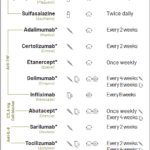Experts identify barriers to shared decision making in rheumatology & offer actionable tools to integrate SDM into practice for better patient outcomes.


Experts identify barriers to shared decision making in rheumatology & offer actionable tools to integrate SDM into practice for better patient outcomes.

Learn how to identify & combat age-based discrimination for improved communication & better patient outcomes.

Bryn Nelson, PhD |
Recent research led to development of a cumulative genetic risk score for Takayasu arteritis, identifying differing susceptibility between groups with different genetic ancestries.

1949 was a momentous year—astronomer Fred Hoyle coined the term Big Bang, the North Atlantic Treaty Organization (NATO) was formed, and Rodgers and Hammerstein’s classic musical South Pacific opened on Broadway.1 Much less recognized was the publication of an essay by Richard Asher, FRCP, titled the “Seven Sins of Medicine.”2 Although it’s over 75 years…

I couldn’t help but roll my eyes. I was at a mandatory “training session” on patient communication for all clinicians at my institution. There, I was being coached on how to properly talk to patients. In theory, this isn’t a bad thing—we all need more education on how to facilitate inclusive and equitable conversations with…

James Topilow, MD, & Yvonne M. Golightly, PT, MS, PhD |
Recent proposals in the U.S. to bill for electronic communication with our patients could be seen as a refreshing but contested attempt to battle burnout rates in the present era. A fee for electronic communications between patients and clinicians also acknowledges the value of the clinician’s time and expertise. But is this ethical? Discussion Burnout…

Duke University Rheumatology Fellowship Program: Catherine Sims, MD; Sonali Bracken, MD, PhD; Megan Milne, MD; Nathaniel Harris, MD, PhD; Poorva Apte, MD; Lena Eder, MD; Lisa Criscione-Schreiber, MD, Med; Megan Clowse, MD; & David Leverenz, MD |
Rheumatologists play a critical role in the reproductive health of their patients, but only half of rheumatologists currently ask their patients about reproductive health or family planning issues. A new guideline seeks to change that.

Iris Zink, RN, ANP, RN-BC |
Have you ever asked a patient, “How’s your sex life?” If your answer is “No,” you’re not alone. The Centers for Disease Control and Prevention (CDC) finds healthcare providers don’t talk about sex with their patients for a variety of reasons: They feel uncomfortable discussing sex and sexuality with patients; They believe discussing sex will…

We know a large percentage of the U.S. population falls into a vaccine-hesitant group. In fact, only 60% of Americans plan to be vaccinated against COVID-19, according to an article in The Atlantic.1 Given that rheumatology patients are among the vulnerable, we asked a handful of ACR/ARP members whether they have been vaccinated themselves and…

More than half of regular opioid users suffer from arthritis. Here are three tips to talk to your patients about opioid use and alternative pain management…